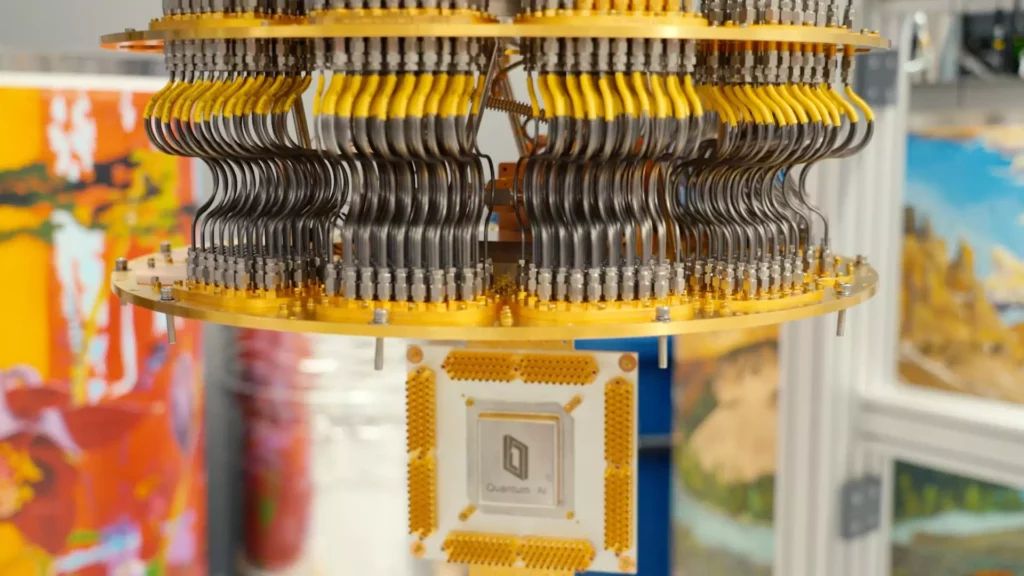The quiet hills of Santa Barbara may soon echo the footsteps of a revolution that’s brewing in the realm of technology. At the heart of this transformation is Alphabet’s Google Quantum AI division, with its team of scientists poised to disrupt everything we think we know about computing. This is not merely a technical upgrade; it represents a fundamental shift in our relationship with data and artificial intelligence (AI). In an age where every byte of information is precious, the marriage of quantum computing and AI could initiate a new epoch in how we process, interpret, and utilize data.
Google’s hardware director, Julian Kelly, articulates the potential of this innovative union with palpable enthusiasm. According to him, the impact of quantum technology on AI could be unparalleled, suggesting that we are on the brink of redefining our technological landscape. This optimism, however, shouldn’t be taken lightly. As history shows, with great potential often comes an equal measure of uncertainty. The question of whether Google can successfully leverage its quantum initiatives to become a linchpin in the AI evolution remains pressing.
The AI Landscape: A Race Against Time
Despite Google’s storied history of innovation, the company has recently found itself in a precarious position, especially characterized by its delayed response to the rising tide of generative AI spearheaded by OpenAI’s ChatGPT. This urgency is tangible—as if the tech giant is racing against its own legacy. The unveiling of Willow, a groundbreaking quantum computing chip, may just be their ace in the hole. This new technology is not merely about speed; it’s about unlocking problem-solving capabilities that would be unimaginable for classical computers.
What makes Willow particularly compelling is its responsiveness to a pressing challenge in AI: the consistent lack of high-quality training data. The revolutionizing promise of quantum computing lies not just in its raw speed, but in its ability to create innovative data sets. For a field constantly seeking to overcome bottlenecks, especially in generating relevant and diverse data, this technology could provide the much-needed propulsion.
Error Correction: The Vanguard of Progress
Another remarkable feature of Willow is its incorporation of additional quantum bits for minimizing errors, which John Preskill—a well-respected figure in the quantum domain—has cited as a significant milestone. Error correction has long been a stumbling block in quantum computing, and addressing it could unlock a myriad of commercial applications that were previously thought to be merely theoretical. The practicality of this technology is ambitious yet tantalizing, as it aims to operate within real-world parameters.
This raises the stakes immensely. Should Google succeed in turning theoretical principles into something of palpable utility, it could blame neither a lack of ambition nor foresight. Instead, they may emerge as pioneers in a new age of quantum-enabled AI that could stretch across numerous fields—from healthcare to environmental sciences—revolutionizing how we navigate our world.
AlphaFold: A Preview of the Future
Consider AlphaFold, the AI system designed for predicting protein structures that garnered accolades including the 2024 Nobel Prize in Chemistry. Its success emphasizes the transformative potential of intertwining quantum data generation and AI capabilities. The implications are vast: if quantum computing can continue to refine and create datasets that are currently beyond our reach, it would become indispensable within the scientific community, potentially accelerating breakthroughs in drug discovery, materials science, and various other critical sectors.
Thus, not only does Google stand to redefine technology through quantum computing, but it could also catalyze advancements that transcend sectors. The interconnectedness of quantum capabilities and AI could signify the dawn of a novel paradigm, revealing paths to solving complex scientific queries that have eluded researchers for generations.
The Road Ahead: An Informed Optimism
As Google seizes this moment, the stakes could not be higher. They might not just secure their place in an evolving tech arena but could also usher in transformative changes that resonate through every domain. The convergence of quantum computing and AI speaks to a broader narrative that transcends mere technological advancement; it’s about harnessing these tools to tackle pressing real-world challenges.
While skepticism about the tangible benefits of this burgeoning field remains healthy, it is equally crucial to embrace the potential that lies ahead. The interplay of quantum computing and AI is a canvas of endless possibilities—one that requires thoughtful engagement, policy considerations, and a vision that balances innovation with ethical considerations.
In an age where change is the only constant, we must actively participate in shaping the future, ensuring that the technological advancements we pursue foster not only progress but also a commitment to the common good. The horizon indeed looks promising, perhaps even quantum.









Leave a Reply